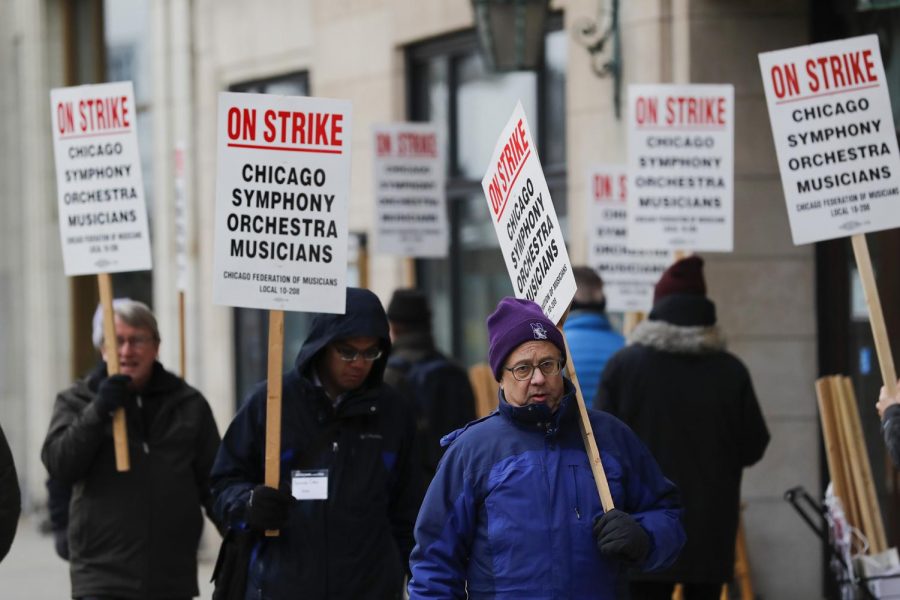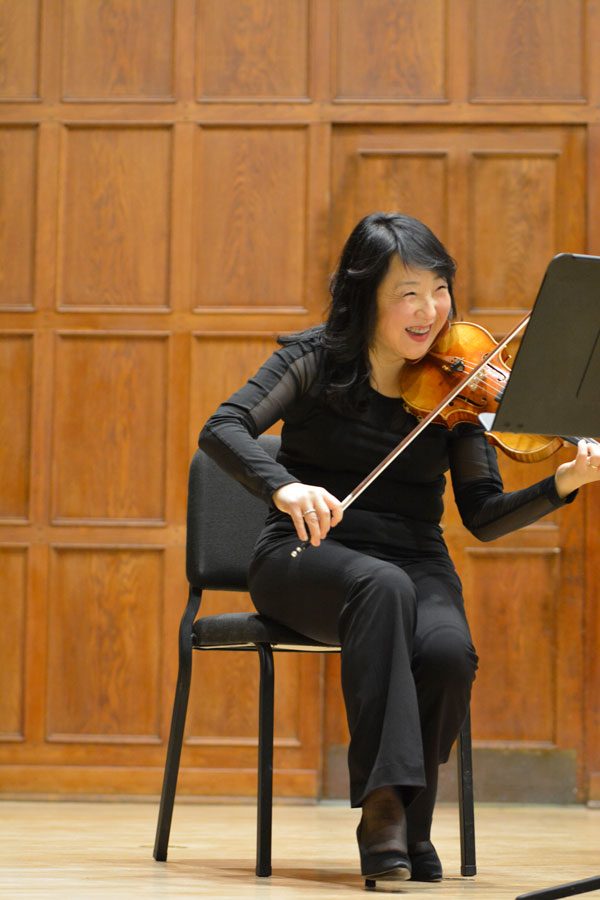Striking Chicago musicians perform at Northwestern
(Jennifer Zhan/The Daily Northwestern)
A Chicago Symphony Orchestra musician plays in a chamber concert in Lutkin Hall as the Chicago Symphony Orchestra’s strike enters its fourth week.
April 4, 2019
As the Chicago Symphony Orchestra’s strike enters its fourth week, the protesting musicians have made their way to Northwestern’s campus. Five CSO members, including three Bienen School of Music professors, put on a chamber concert in Lutkin Hall to show thanks to supporters.
The three-concert series, “From the Heart of the Orchestra,” began Monday in Chicago and continued to Wednesday at 7:30 p.m.. Free to the public with prior registration, the series is an expression of gratitude to the orchestra’s audience, said CSO violinist and adjunct associate professor Blair Milton.
“What we do is make music and we intend to continue to make music,” Milton said. “By reaching out to these audiences, we are hoping that they will raise their voices to the powers that be to show how much they miss being able to enjoy the music and be thrilled by the music that we offer.”
Various combinations of CSO musicians have been performing concerts throughout Chicago and the nearby suburbs while they have been on strike.
The strike is largely the result of a salary dispute. CSO clarinet player and senior lecturer J. Lawrie Bloom said disagreements arose when the Chicago Symphony Orchestra Association sought to remove the defined-benefit pension plan in its new contract, which would originally have guaranteed a set retirement benefit for the musicians.
“What that (change) would present is a situation where the musicians have no guaranteed pension of any kind when they leave,” Bloom said. “We disagree. We don’t think that’s a good idea.”
After negotiations broke down in September, time was ticking to find a better alternative. Well into the new year, the allotted period for discussion expired, and the strike began March 10. For the time being, official symphony orchestra concerts are canceled through April 9, but no agreement has been reached yet for resolution.

Members of the Chicago Symphony Orchestra musicians union walk the picket line on Monday, March 11, 2019 outside of Symphony Center in Chicago, Ill.
Henry Girard, a Bienen first-year, said he supports the strike and would have attended the concert if he did not have a prior engagement.
He added that in a major city like Chicago, where housing prices and the cost of living is especially high, it is vital for the musicians to have a stable income and benefits.
“It’s already such a hard career to be in financially and it puts you in a really financially unstable position for your entire life,” Girard said. “I feel like those things should be ensured if you’re going to go into this field.”
Wednesday’s concert included “thrilling, moving, inspiring” music, Milton said, featuring a sonata by Jean-Marie Leclair, a string trio by Ludwig van Beethoven and a clarinet quintet by Carl Maria von Weber. As pieces of the CSO’s repertoire, Milton said these compositions are a universal language used to communicate with people all over the world.
“Music is what binds us together as a culture and a society. You can’t imagine life without music,” Milton said. “Imagine your favorite movie and listen to it with the soundtrack turned off. How much of the dramatic moments would you feel are dramatic if there wasn’t music to go with it?”
Milton added the concert series serves as a reminder of the musician’s mission to communicate through music. However, the financial fallout is for the orchestra’s management to handle. He said the pension removal will hurt the CSO’s ability to attract top tier players, and that it is essential for the orchestra to continue to make music.
“People turn to music in moments of joy and moments of sadness and after catastrophes in their lives,” Milton said. “Music is what helps heal and bridge the gap between cultures.”
Email: [email protected]
Twitter: @pamesjollard


